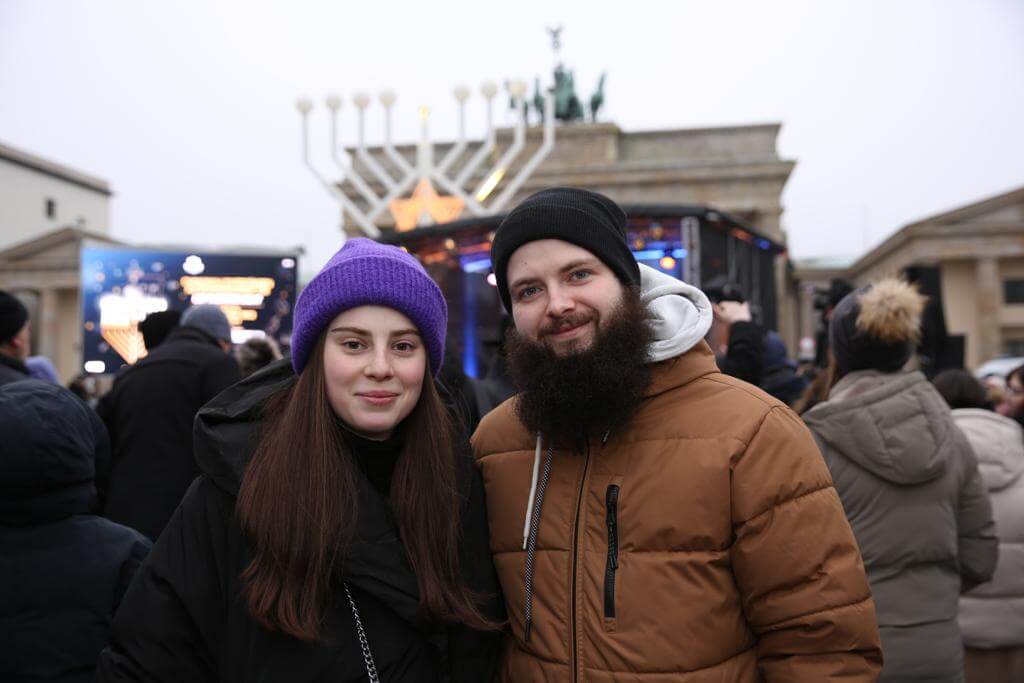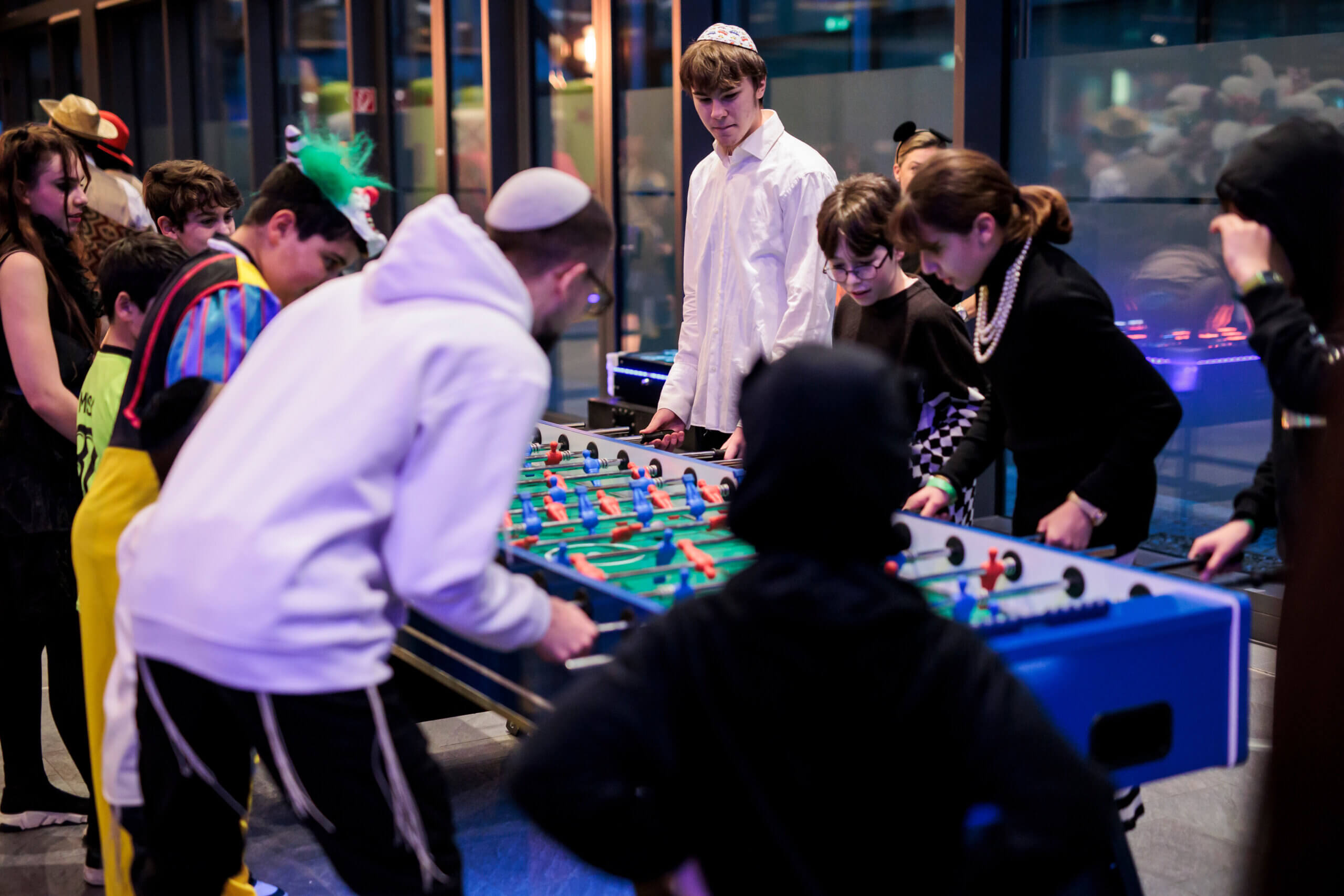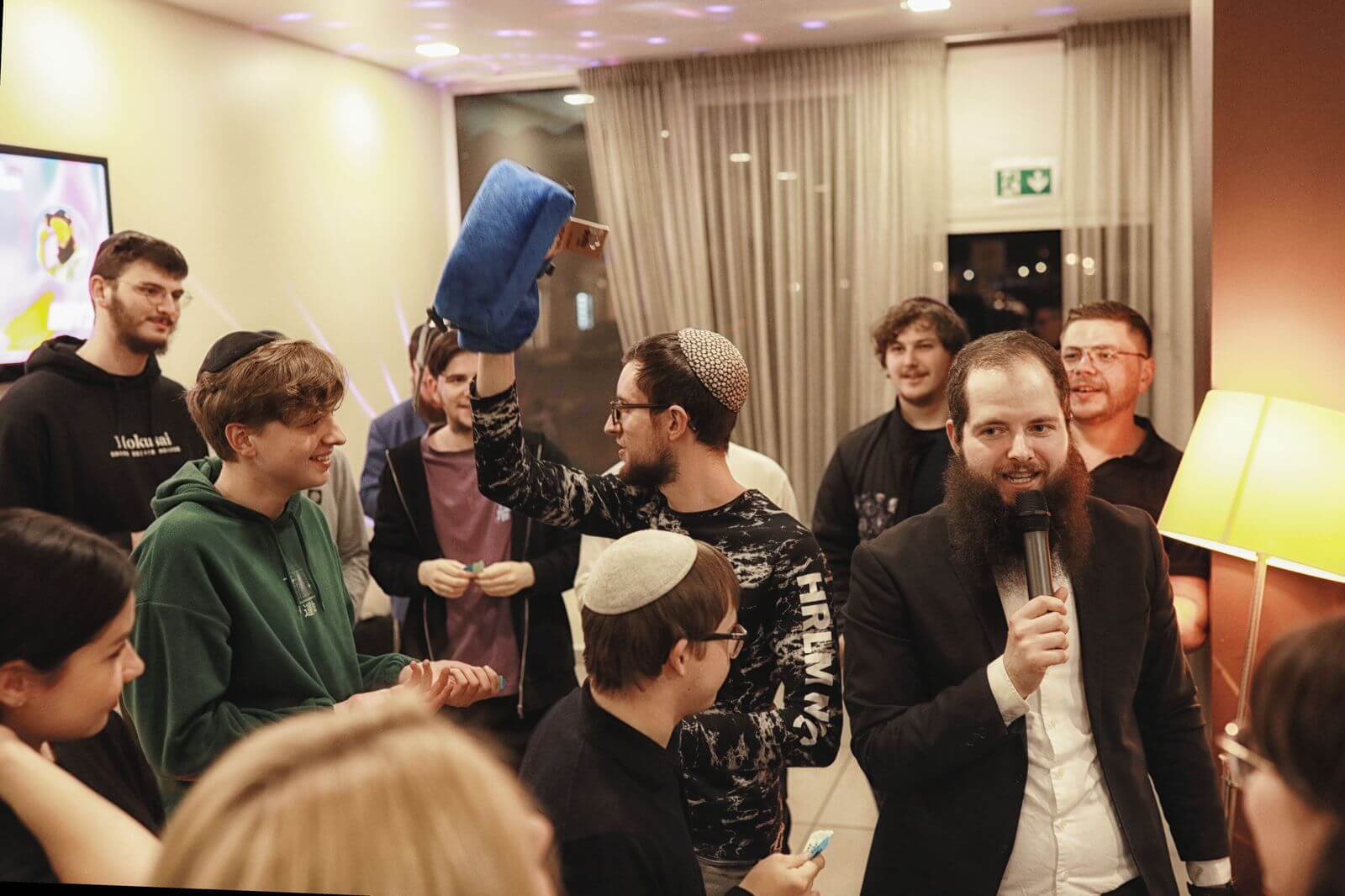Germany gave these Ukrainian Jews sanctuary. But do they want to call it home?
Before they found shelter in Germany, the Yakovemkos had stayed away from the country and associated it with the Nazis

Graphic by Angelie Zaslavsky
BERLIN — Before being forced to flee Kyiv, Yonatan and Miriam Yakovemko had vacationed in more than 10 countries around Europe since meeting at a Jewish summer camp in western Ukraine five years ago. The Orthodox Jewish couple had visited France, Italy and Greece — but not Germany, the country where they would ultimately find themselves living as refugees.
“We never thought that we would come here,” Miriam said during a recent interview in the German capital.
The history of Jewish persecution loomed too large for the couple, who shared an apartment in Kyiv where they worked as Jewish educators, until Russia invaded the country last winter. Suddenly, forced to flee Ukraine, the Yakovemkos found sanctuary in Berlin, two among thousands of Jewish refugees in Germany.
It has been a strange experience for many Ukrainian Jews, some of whom have felt awkward as Germans, seemingly eager to atone for the country’s Nazi past, feted them as celebrities. Another uncomfortable fact: Most Jews in Germany arrived from the former Soviet Union, and at least a handful support Russia’s invasion.
But the jarring experience of finding shelter in a country that once tried to destroy its Jewish population has slowly worn off for the Yakovemkos. Miriam said when she first arrived in March of last year, she felt uneasy surrounded by people speaking German. But a few months ago, she encountered a Jewish woman speaking Yiddish with her child, and realized that her German lessons also helped her understand Yiddish. “When I realized that I understood Yiddish because it was similar to German it was a good feeling,” she said.

Miriam also found solace in a Red Army medal her grandmother had won for taking part in the liberation of Berlin when she was 22. The commendation is listed on her grandmother’s military identification card, which Miriam brought to Berlin with other important documents, although the medal itself is still in Ukraine.
What she and other Jews like Yakovemkos are asking themselves now is: Do we want to stay here? They are Ukrainian and Jewish, but could they also think of themselves as German? Some, like the Yakovemkos, are giving themselves time to answer that question.
“I don’t think you can compare Kyiv and Berlin,” Miriam said. “It’s like two different planets.”
They are among nearly 5 million Ukrainian refugees who have registered for protection in European countries, including 1 million in Germany alone. Only a tiny fraction of these refugees are Jewish — Ukraine was home to between 56,000 and 140,000 Jews before the war began — and more than 30,000 of them reportedly landed in Germany. That dwarfs the 14,000 Jewish Ukrainians who have immigrated to Israel since the war started.
Young married couples like the Yakovemkos are somewhat unusual among Ukrainian refugees, because of a government ban on men between 18 and 60 leaving the country and aggressive conscription efforts. But many military-age men have nonetheless left, and they account for roughly 25% of the total refugee population.
Refugees in Germany qualify for citizenship if they meet certain requirements, like speaking German and living in the country for six years. But much depends on the course of the war in the next year.
As the war in Ukraine drags into its second year, many refugees have returned from Germany as it became clear that the conflict was not going to end quickly. Those who have stayed, like the Yakovemkos, are now trying to lead normal lives while still stuck in a kind of limbo.
‘People say Shabbat Shalom’
Miriam and Yonatan live in a hotel that was converted into a shelter for refugees by Chabad Berlin and are trying to learn German, which would help them find work outside the Jewish community. Yonatan, 26, has a degree in electrical engineering and Miriam, 22, was trained as a social worker in Ukraine.
They were part of the Chabad community in Ukraine and chose to flee to Germany over Austria and Israel at the suggestion of a rabbi they knew back home who was also going to Berlin. Yonatan makes the 15-minute walk from the hotel to the Chabad complex for prayer three times a day. He and Miriam occupy the rest of their time with German lessons and organizing Jewish education in Russian for kids and adults who live in the refugee hotel and elsewhere in Berlin.
They have slowly started to master Germany’s notorious bureaucracy, which can require what feels like an endless series of forms to complete simple tasks like arranging a doctor’s appointment.
“Once you understand the system, can a little bit understand the language, can a little bit speak with people, you realize all of the people want only good for you,” Miriam said.
Germany began rebuilding its Jewish community after the fall of the Soviet Union, inviting Jews from former communist countries to immigrate. Estimates of the current population vary, but it is thought to exceed 100,000 with a large share concentrated in Berlin. In recent years, Jews from the former Soviet Union have been joined by thousands of Israelis and other international arrivals.

Yonatan said that walking around his neighborhood wearing a yarmulke he receives friendly greetings from Germans on the street.
“People say ‘Shabbat Shalom’ – Oh, I see a Jewish person here, ‘Shabbat Shalom!’” he said. “It’s not aggressive, it’s always with smiles.”
Despite this warm welcome, they also feel the pull of home.
Miriam’s parents are staying at the same hotel in Berlin, but Yonatan’s parents weren’t interested in leaving Zhytomyr, a city in northwestern Ukraine where he was raised. “They don’t want to go to another city,” said Yonatan, who speaks on the phone to them every day. “It’s hard – it’s hard.”
And while its Jewish population has been growing, Germany, where Reform Judaism was created in the 19th century, still does not have a large Orthodox population. That means it’s harder to find a good variety of kosher food and Miriam said she still misses the pita bread, sweets and kosher meats and sauces available at Kyiv’s Jewish cafes.
Though they lived in the city for just four months before the war broke out, they have many friends in Kyiv and elsewhere in Ukraine, although most of their belongings are now with them in Berlin. They were evicted from their Kyiv apartment last May after they fled the country and Miriam had to hastily return to collect their clothes and other items.
The couple said that they had a pleasant life in their home country, and, contrary to reports of a strong white supremacist undercurrent in Ukraine, they did not experience any discrimination.
“The government passed a law making antisemitism illegal and it worked,” Miriam explained, referring to a piece of legislation approved just before the war.
So for now the Yakovemkos live in limbo in a country that feels more comfortable than they had once imagined.
“We need a lot of time to see what happens in Ukraine,” Yonatan said. “A lot has changed.”
















